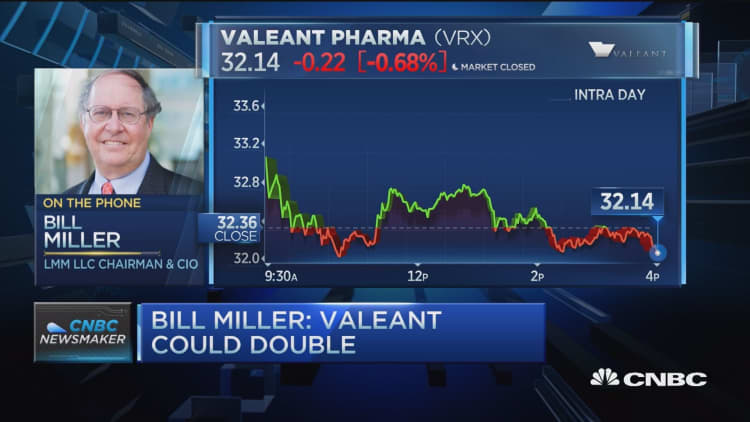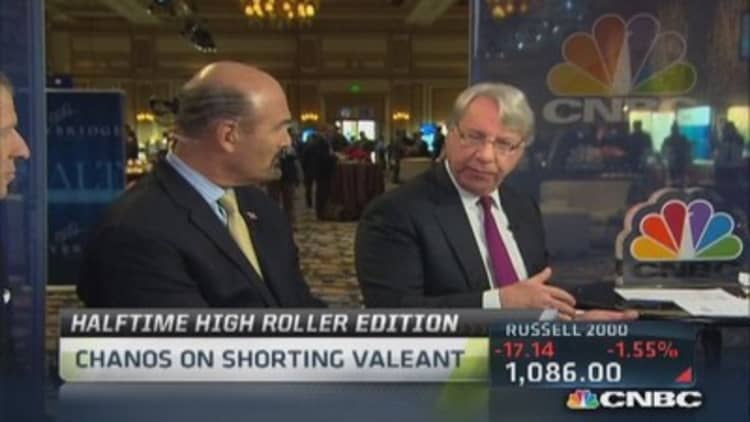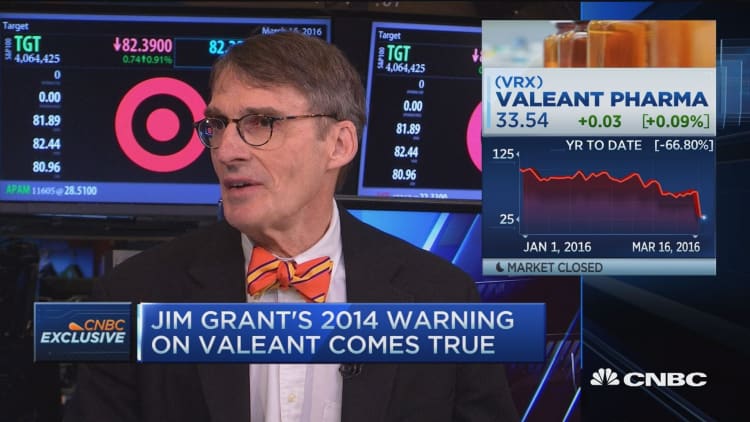
Price is what you pay, but value, as Warren Buffett has observed, is what you get.
Lately, big-name investors like Bill Miller and Aswath Damodaran are betting they'll get more than they paid for out of shares of troubled Valeant Pharmaceuticals International, which on Monday named new leadership.
Both built positions in Valeant when it was trading around $32 a share, compared with its all-time closing high of $263 last August.
The company's deep and dramatic sell-off is a key part of their attraction. "It's probably the most toxic name in the market," Miller told CNBC's "Closing Bell" on Friday.
Valeant's share prices were up about 3 percent Monday, after the company named Joseph Papa to succeed Michael Pearson as chairman and chief executive. The company said Papa, the 60-year-old chairman and CEO of drug company Perrigo, is expected to join Valeant early next month.
"It's been in the papers almost every day," Miller told CNBC on Friday. "There are worries about the debt, about the pricing, about the business model, about Michael Pearson."
In other words, it has what Michael Burry, the Scion Capital investor and star of Michael Lewis' "The Big Short," would call the "ick" factor.
High rollers

"I tend to become interested in stocks that by their very names or circumstances inspire an unwillingness — and an 'ick' accompanied by a wrinkle of the nose — on the part of most investors to delve any further," Burry once wrote in a shareholder letter.
That is certainly the case for Valeant, whose plunging share price has been accompanied by congressional inquiries into its drug pricing, outrage from hospitals and backlash from the general public and other key players in health care.
The bad blood had been simmering quietly for years as competitors watched Valeant shun the industry's traditional heavy spending on research and development for a "roll-up" approach driven by buying smaller, niche, more unique existing drugs and creams and, typically, raising their prices.
"A roll-up is a roll-up," Kynikos Associates founder and noted short seller Jim Chanos told CNBC in 2014 explaining why he was short the then-darling stock. In order to keep up the stock price, which in Valeant's case was also largely its executives' compensation, "you have to deliver value by delivering bigger and bigger acquisitions and usually those companies go an acquisition too far," Chanos said.
Perhaps Valeant's failed bid for Botox-maker Allergan around the same time was that step too far. Allergan chief executive David Pyott reacted furiously, including with a slide presentation excoriating Valeant's business model.
Heart of the matter
From Valeant's point of view though, Allergan was the "perfect strategic combination." After all, its strengths, like Valeant's, were in dermatology and aesthetics, and there were synergies in ophthalmology and emerging markets. Valeant also touted the success of its Bausch & Lomb acquisition the year earlier, noting it was able to wring even more cost-cutting out of the eye-care giant than its previous private equity holders had.
As that deal failed, however, Valeant looked for other ones. "Valeant marched on undeterred, paying up big for Salix," wrote Andrew Left of Citron Research Group, who also sounded off on Valeant's reliance on specialty pharma company Philidor for sales in a series of pieces that helped fuel the stock's sharp decline. Valeant then also bought two drugs from Marathon Pharmaceuticals, and as Left put it, "a group of increasingly poor quality assets (Dendreon and Sprout), doubled its debt load, and executed an increasingly objectionable set of extreme drug price jacks."
Seattle-based Dendreon filed for bankruptcy protection after its prostate cancer drug went over poorly with the public as competitors quickly picked up market share. Valeant paid $415 million for it and was reportedly the only bidder. Sprout Pharmaceuticals, which Valeant bought for about $1 billion, is best known for offering Addyi, or "female Viagra."
It was the steep price hikes on the two Marathon heart drugs, though, Isuprel and Nitropress, that saw Valeant really begin to unravel. The move into a field much different and with bigger stakes than say, its Jublia toe-fungal treatment drew the ire of cardiologists and by late April, front-page attention from The Wall Street Journal.
"On Feb. 10," the Journal's opening sentence read, Valeant "bought the rights to a pair of life-saving heart drugs. The same day, their list prices rose by 525% and 212%."
Why? "The extreme price hikes on these two drugs were the only reason Valeant beat" Wall Street's earnings estimates in its first quarter of 2015, Left conjectured.
In any case, the move intensified public acrimony over spiraling drug prices, drew ire from presidential candidates, particularly Hillary Clinton, and has made Valeant the subject of a congressional probe. Shares of the company were down more than 90 percent at one point from their peak. Now, Valeant is dealing with restated financials, the departure of its CEO, a heavy debt load left from its acquisition spree, and the possibility of defaulting on its bonds if it doesn't meet filing deadlines.
The case for $90

All that said, investor and professor Damodaran, often called the "dean of valuation," told "Closing Bell" after building his position in Valeant that "at the right price, even a bad company can be a good investment."
"I assume it's bad news they're holding back," Damodaran said, regarding the company's delayed financials. "There's a very real chance, I don't think it's huge, they could be pushed into default." Damodaran has lowered his estimate of the company's value per share from $77 last November to about $43.
Even that $43, though, implies that Valeant can successfully transition from a fast-growing roll-up to more like "a traditional pharma company with a fairly significant eye-care and cosmetics arm," Damodaran said. Revenue growth, "if they're lucky," would be about 3 percent to 5 percent a year, he said. And that's assuming Valeant doesn't have to sell off Bausch & Lomb or other significant assets.
Miller, chief investment officer at LMM Investments, pointed to the recent rebound in the price of Valeant's bonds, which LMM owns in its income fund. "They've had a pretty nice rally here the last weeks," he said, and are now yielding around 8.5 percent to 9 percent; and the last time that happened, Valeant shares were trading around $65. "The equity has not caught up to the rally in the bonds," Miller said.
Further, Miller believes the company's free cash flow this year and next will largely go toward paying down its debt load of more than $30 billion. "Busted roll-ups, if the businesses they bought are good, cash-generative business, that cash will be used to pay down the debt."
"I think the shares are worth at least $60, and we could get to significantly higher prices than that," Miller said. If Valeant can generate $7 per share in free cash flow this year, and $9 next, "typically a company would trade around 10 times that, so "other things equal and without controversy, a $90 potential price within a year or two is not unrealistic," he said.

Jim Grant, editor of Grant's Interest Rate Observer, who made his case against Valeant in March 2014, isn't so sure. "There is an existential threat to the solvency of the company on account of its …lack of filing, its accounting problems," he told "Closing Bell."
"You'd think that a company could do this," he added, referring to the fact that Valeant also "has very light debt obligations the next couple years," and should be able to make its fixed payments.
"There's nothing wrong with it exactly," Grant said, "except that it's Valeant."
Correction: This story was revised to correct the spelling of Buffett.



